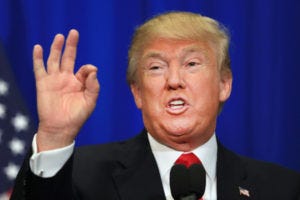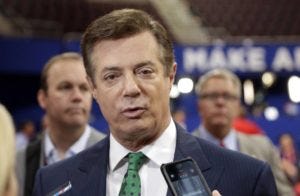Pardons, Bribery, and President Trump
President Trump’s personal lawyer John Dowd resigned two weeks ago. Shortly after he left the president’s legal team, there were reports in the New York Times and Washington Post that last year Dowd allegedly told lawyers for Trump's former campaign manager Paul Manafort and former national security advisor Michael Flynn that Trump would consider pardoning their clients. The implication was that the offer of a pardon was made to encourage Manafort and Flynn to stand firm and not cooperate in the Mueller investigation. In the wake of those reports, there was a lot of debate about whether Trump offering pardons to potential witnesses could constitute obstruction of justice. But last week I wrote this column in the Washington Post suggesting an alternative legal theory: conspiracy to commit bribery. The bribery charge offers prosecutors some important legal advantages over obstruction of justice. There’s a lot more to say about bribery, pardons, and president Trump, so I’m taking a deeper dive in this post. For the record, let me offer my standard disclaimer: I’m not accusing anyone of committing these crimes. This is an academic discussion of potential legal theories that could apply, and their implications. Whether there is evidence that such crimes actually occurred is up to Bob Mueller, and I don’t claim any special insight into what he has (or has not) discovered.

Bribery Theory A: Bribing President Trump
The federal bribery statute, 18 U.S.C. 201, requires the government to prove that a public official agreed to be influenced in the performance of an official act in exchange for something of value. As I explained in the Post, under one pardon bribery theory the government could charge that the president solicited bribes from Manafort and Flynn. In exchange for their agreement not to testify, Trump would promise the official act of granting them a pardon. Although it’s never been tested, there’s little doubt that the president is a “public official” under section 201. That term is defined to include “any officer or employee or person acting for or on behalf of the United States or any department, agency, or branch thereof.” The president acts for the executive branch and fits this definition. And although Congress specifically exempted the president from other corruption and conflict of interest statutes that appear in the same chapter of the criminal code -- see 18 U.S.C. 202(c) – it did not include the bribery statute, section 201, in that exemption. That is perhaps the clearest evidence that Congress intended the bribery statute to apply to the president. The president’s attorney, however, is not a public official. If the theory was that Dowd conveyed offers of pardons on Trump’s behalf, then the charge would be conspiracy to solicit bribes. You can conspire with someone to help them commit a crime even if the underlying statute doesn't apply to you; for example, a staffer to a Senator could act as an intermediary to arrange bribes on the Senator’s behalf. Proof of such a conspiracy would require evidence that the president and Dowd agreed on this course of action and Dowd then carried it out. If there was a conspiracy to solicit bribes, it doesn’t matter whether the solicitation was accepted. The crime would be the agreement between Dowd and the president to offer the pardons in exchange for silence, followed by some effort to try to carry out the agreement. In a conspiracy charge, success of the underlying scheme is not required. The official act would be the president granting a pardon. Although the Supreme Court’s recent decision in the Bob McDonnell case restricted the definition of “official act,” that would not be an issue here. The Court said an official act must involve some exercise of government power, a “decision or action” on a “question, matter, cause, suit, proceeding, or controversy.” I don’t think there’s any doubt that the presidential act of granting a pardon would be an “action” on a “matter” that would meet the McDonnell standard. The thing of value in this bribery scenario would be the agreement not to cooperate against the president. “Thing of value” is defined very broadly and can include intangibles as well as money or property. A promise not to testify against the president or otherwise cooperate in Mueller’s investigation would be of subjective value to Trump and therefore could serve as the thing of value in a bribery charge. To sum up: under bribery theory A, the president offers to accept an agreement not to cooperate (thing of value) in exchange for being influenced in the performance of an official act (granting a pardon).
Bribery Theory B: Bribery of a Witness
There is an alternative bribery theory that could be charged under the same statute, 18 U.S.C. 201. Under section 201(b)(3), if a witness was offered a pardon in exchange for refusing to cooperate in the Mueller investigation or for changing his testimony, that could constitute bribery of a witness. The statute makes it a crime to corruptly give, offer, or promise anything of value, directly or indirectly, to a witness in any kind of proceeding “with the intent to influence the testimony under oath or affirmation” of that person, or “with intent to influence such person to absent himself” from the proceeding. This theory simply flips the bribery transaction around. Instead of the witness bribing the president in order to obtain the official act of a pardon, the president (or someone acting on his behalf) would bribe the witness. In this scenario, the pardon is the thing of value offered as a bribe, rather than the official act done in exchange for the bribe. The pardon would be offered to the witness in exchange for influencing his testimony in Mueller’s grand jury investigation. Unlike theory A, this doesn’t require the government to prove that a public official was involved – anyone can bribe a witness. Nor would the government have to prove an “official act” under McDonnell. One potential benefit of this theory is that it could apply even if the president was not involved in the bribe. For example, supposed Dowd or someone else close to the president told a witness, “Look, just don’t say anything in the grand jury, or lie about what happened, and I’ll get the president to grant you a pardon.” If I made such an offer it would not be credible and likely would not influence anyone to agree. But if the president’s personal lawyer or someone else actually in a position to persuade the president made such an offer, I think that promise could constitute a thing of value – even if the president was not aware of the offer. The statute provides the thing of value may be promised “directly or indirectly” – offering to persuade the president to grant a pardon could be considered an indirect offer or promise.
Advantages of a Bribery Charge
Most discussion in the wake of the news about Dowd offering pardons has concerned whether it could amount to obstruction of justice. But the obstruction argument faces at least one potential legal hurdle. Ever since the president fired James Comey, some have argued that a constitutionally authorized act by the president, such as firing the FBI director or granting a pardon, can never be the basis of an obstruction charge. The most prominent advocate of this view has been Professor Alan Dershowitz, who claims it would be unconstitutional to prosecute a president for a constitutionally-authorized act simply because it was done with corrupt intent. Dowd himself echoed this view at one point. I think this is wrong, and I’ve explained why I disagree with Dershowitz in earlier posts (see here and here). But the beauty of the bribery theory is that it avoids this argument altogether. If a pardon was offered in exchange for silence or influencing testimony, the crime is that bribe agreement, not the pardon. It would not matter whether the offer was accepted or the pardon was actually granted. In a bribery case the crime is the corrupt deal (or offer of a deal) – the deal need not be carried out. Even critics like Dershowitz agree that if a president engaged in other criminal conduct, such as accepting a bribe in exchange for a pardon, he would be subject to prosecution for bribery. He reiterated that point just this past weekend, on Meet the Press. If the facts were there to support a bribery charge, it would offer prosecutors a way to avoid all the debate over the obstruction of justice theory. (Whether a sitting president can or should be indicted or whether the only proper remedy is impeachment is a separate question.)

Paul Manafort
Manafort and the Effect of a Pardon
Manafort and Flynn obviously have not been pardoned, at least not yet. Flynn did take a plea deal and has agreed to cooperate with investigators, suggesting that if there was an offer of a pardon in exchange for refusing to cooperate he turned it down. Manafort’s co-defendant Richard Gates also pleaded guilty and agreed to cooperate. But so far Manafort has refused to plead. He is likely facing the rest of his life in prison, with no readily apparent defense to the charges against him. So why doesn’t he cut a deal? A popular theory is that Manafort is holding out and counting on a pardon. That could lend credence to the story that the offer of a pardon was dangled in front of him if he would only stand fast and not cooperate. But that is an uncertain and risky strategy. First, it requires him to trust the famously volatile president to keep his word. It’s easy to imagine Manafort holding up his end of the bargain only to have the president, perhaps on the advice of his new attorney, decide that pardoning Manafort would be a bad idea. Many have suggested Trump may not want to grant pardons because a pardoned witness no longer has a Fifth Amendment right to remain silent and Mueller could then force them to testify. But that risk to the president seems minimal to me. Presumably the corrupt agreement would be that in exchange for the pardon the witness, if called to testify, would play ball and cover up for the president. If that resulted in additional charges of perjury or obstruction, the president presumably could pardon the witness again. In addition, if a witness still faced potential prosecution for state charges, they could continue to take the Fifth and refuse to testify even afer being pardoned. It’s potential state charges that pose the real risk to Manafort in holding out for a pardon. The president can only issue pardons for federal crimes, not state ones. Manafort in particular faces a number of potential New York state charges, and there have been reports that New York Attorney General Eric Schneiderman has been cooperating with Mueller. It seems likely that Schneiderman is ready to step into the breach and prosecute Manafort on state charges if Trump issues a pardon. Could Manafort be afraid to cooperate? After all, the Russians recently poisoned a former Russian double agent and his daughter, and have carried out similar attacks in the past. Depending on the types of Russians Manafort is entangled with, I suppose it’s not out of the question that he is afraid to cooperate out of fear for his own safety or that of his family. We will have to wait and see how the Manafort prosecution plays out. He may still cut a deal and agree to cooperate. And as the Mueller investigation proceeds, perhaps we will someday learn whether there is any truth to the reports about pardons being dangled in front of potential cooperating witnesses.
Like this post? Click here to join the Sidebars mailing list

